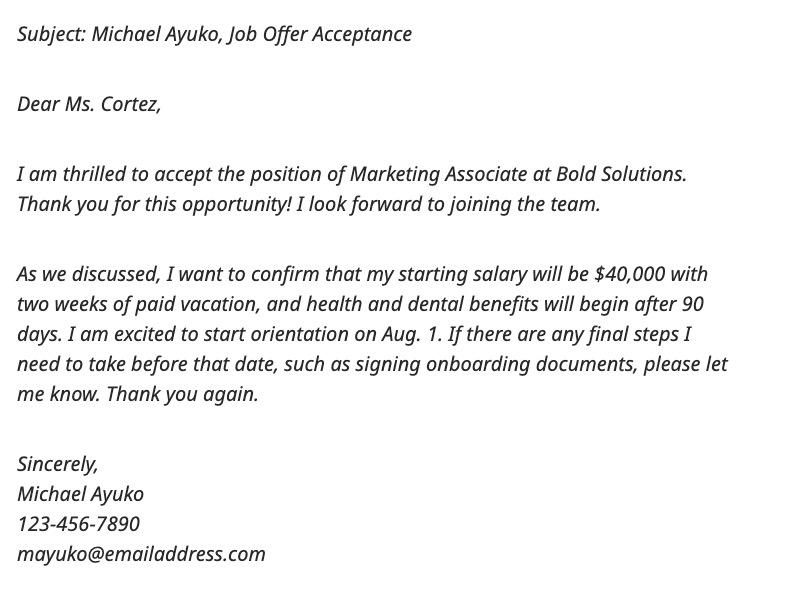Did you receive a job offer, or are you looking to get one soon? While you may be eager to accept it right away, there are steps you need to take first. These steps ensure you get the most out of an offer and limit confusion. So, how do you accept a job offer the right way?
In this article, we’ll discuss the job offer timeline, questions to ask before accepting a job offer, writing an acceptance email, and steps to take after.
Job Offer Timeline
The length of the hiring process varies, but it often takes a few weeks. According to Glassdoor, it takes an average of 23.8 days for US candidates to receive offers, with some cities and industries taking much longer – 33 days or more.
Now, what about after the final interview? Give it 3 business days. If you still haven’t heard back, follow up. Doing so shows them your diligence and that you care about this position.
You can follow up a second time in 10-14 days if you still haven’t heard, reminding the company why you’re a great fit.
Informal vs. Formal Job Offer
Informal job offers are usually verbal and will ask you about the terms you need to accept an offer. This discussion can include salary, benefits, working arrangements (in-office vs. at-home), and more.
Formal job offers are usually emailed with documents to review. If the company calls you, ask for written confirmation with detailed terms.
Insist on getting all details in writing, including expectations, pay, benefits, start time, etc. You’ll want to review these details closely before accepting a job offer.
Questions to Ask Before Accepting a Job Offer
Before accepting a job offer, ask intelligent questions to ensure – as much as you can – that this role and company are a good fit.
If you didn’t in the interview process, ask questions regarding the following:
- Salary (and is there a sign-on bonus?)
- Your role (how is success measured, immediate priorities, expectations when starting vs. over time, etc.)
- Promotion and career growth opportunities
- Company culture and core values (do these align with your own?)
- Policies on diversity, equity, and inclusion
- Work-life balance
- Work from home vs. in-office
- Health insurance
- Equity
- Educational opportunities (whether formal tuition or more informal opportunities such as conferences)
- Retirement
- Boss and team arrangement, and if you can meet any of them before starting
How a company responds to such questions will tell you a lot about what it would be like to work for them. Are they willing to answer all questions truthfully, or do they avoid them? Do they appreciate your detailed questions or think they’re overkill? (Reminder: they’re not overkill.)
Accepting a Job Offer Via Email
Here’s how to accept a job offer via email.
Step 1: Respond Quickly, and Ask For More Time If Needed
If you aren’t ready to accept immediately – which you shouldn’t be because you need time to review the offer and negotiate – send a response right away, ideally within 1 day, thanking the company and telling them when they can expect a decision. You can also ask them when they need a decision from you.
Step 2: Prepare to Negotiate
Negotiation is part of the process for accepting a job offer. 70% of managers “expect a salary and benefits negotiation” but don’t make clear that the offer can be negotiated. 58% of Americans don’t negotiate job offers, yet those that do are successful 85% of the time.
Unfortunately, men are offered higher salaries for the same job 60% of the time, yet women only negotiate 34% of the time, compared to 46% for men. So if you’re a woman, it’s extra important to negotiate.
To best prepare for a negotiation, know what you’ll ask for and the skills you have to back that up. Prepare for shock or resistance from managers – they might use this to deter you – but it doesn’t mean you won’t be successful.
Learn more on how to negotiate a job offer here.
Step 3: Officially Accept
Wondering how to write an email accepting a job offer? Once negotiations are settled and you’re happy, here’s what you’ll write.
Your job offer email should have a clear subject line, ex: “[FULL NAME] Job Offer Acceptance.” You want to ensure your email stands out in the hiring manager’s inbox.
Make the letter brief, express thanks, and state that you accept the offer. Outline any important terms again – salary, start date, vacation time, working schedule – to ensure nothing is missed. Finally, proofread the letter a few times before sending.
Example Job Offer Letter:

Step 4: Ask About Next Steps
After accepting a job offer, you’ll want to ask the hiring manager for next steps. These next steps can include paperwork, onboarding processes, or anything else required before your start date.
What To Do After Accepting a Job Offer
Accepting a job offer is done! Now what?
Step 1: Notify Your Current Company
Let your current boss know that you’ve accepted a job elsewhere. Give them a verbal heads-up before writing a resignation letter, and state that you’re willing to do everything possible to make the transition seamless.
Your existing company may extend a counteroffer. Read our guide to counteroffers to determine whether or not to accept.
Step 2: Let Other Companies Know
If you’ve been interviewing with other organizations, let those companies know you’re accepting a job offer elsewhere. Thank them for their consideration, and keep the tone positive. Maintaining as many connections as you can is only to your benefit.
Step 3: Help With Handoffs
Whether or not you enjoyed the time with your current company, you want to avoid burning bridges. During your final weeks, finish the projects you can, and prepare others to take over those you can’t.
Leave your documents organized, talk with team members to get them up to speed, and answer questions as needed.
Your company may contact you for a couple of weeks after your end date with lingering questions. Anything more than that would be considered excessive, so feel empowered to set boundaries.
Need Help Finding the Perfect Job Offer?
Accepting a job offer is the easy part, but how do you find the best offer for you? Working with an experienced recruiter means fielding offers that are a strong match for your candidacy and having someone on your side to help with the negotiations.
If you’re in a more senior-level position or are planning on climbing the corporate ladder throughout your career, getting to know an executive recruiter is in your best interest. When the time is right to jump into a role with more seniority, the executive recruiter will know you well enough to land you the position quickly.
Jennings Executive is an experienced executive recruitment firm with a long track record of successfully placing candidates. Contact us to start building your dream career today.
















